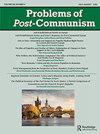痛苦时刻与重组:解读乌克兰外交政策,2014-2022
IF 2
2区 社会学
Q2 POLITICAL SCIENCE
引用次数: 0
摘要
几十年来,乌克兰的外交政策优柔寡断,精英们在权衡国内利益、俄罗斯和西方之间的关系。这篇文章声称,2013-2014年发生了一个关键时刻,导致乌克兰决定性地转向西方,主要有两个原因。首先,顿涅茨克精英阶层的分裂,以及部分选民基础被排除在外的领土损失,削弱了乌克兰国内的“亲俄”政治力量。其次,乌克兰主导的外交政策叙事越来越多地将欧盟和北约描绘成一种文明选择,而将俄罗斯描绘成激进的另类。这篇文章展示了关键时刻如何使乌克兰的转变成为可能,以及乌克兰的亲西方倾向如何从2014年开始稳定下来。本文章由计算机程序翻译,如有差异,请以英文原文为准。
Painful Moments and Realignment: Explaining Ukraine’s Foreign Policy, 2014–2022
For decades, Ukraine’s foreign policy was indecisive, with elites balancing domestic interests, Russia, and the West. This article claims a critical juncture occurred in 2013–2014 resulting in Ukraine’s decisive turn to the West for two main reasons. First, the fragmentation of the Donetsk elite and territorial losses that excluded parts of its voter base weakened “pro-Russian” political forces inside Ukraine. Second, Ukraine’s predominant foreign policy narrative increasingly portrayed the EU and NATO as a civilizational choice and Russia as a radical other. The article shows how the critical juncture made Ukraine’s shift possible and how Ukraine’s pro-Western orientation stabilized from 2014 onward.
求助全文
通过发布文献求助,成功后即可免费获取论文全文。
去求助
来源期刊

Problems of Post-Communism
POLITICAL SCIENCE-
CiteScore
4.00
自引率
12.50%
发文量
33
期刊介绍:
The post-communist countries are the most rapidly changing societies of Europe and Asia. For insight into this twenty-first century revolution, there is no better source than Problems of Post-Communism. Emphasis is placed on timely research covering current economic, political, security, and international developments and trends in Russia and China, Central Europe and Central Asia, Latin America, and Southeast Asia. Clarity and readability make the articles fully accessible to researchers, policy makers, and students alike.
 求助内容:
求助内容: 应助结果提醒方式:
应助结果提醒方式:


